七年级下册英语Unit 12 What did you do last weekend? Section A(1a-2d) 课件+嵌入音频(共55张PPT)
文档属性
| 名称 | 七年级下册英语Unit 12 What did you do last weekend? Section A(1a-2d) 课件+嵌入音频(共55张PPT) |  | |
| 格式 | zip | ||
| 文件大小 | 7.1MB | ||
| 资源类型 | 教案 | ||
| 版本资源 | 人教新目标(Go for it)版 | ||
| 科目 | 英语 | ||
| 更新时间 | 2021-06-17 18:45:23 | ||
图片预览

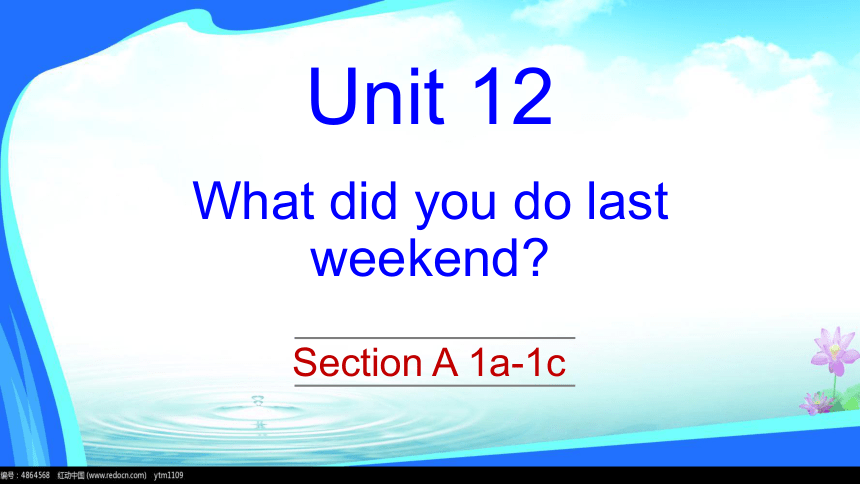
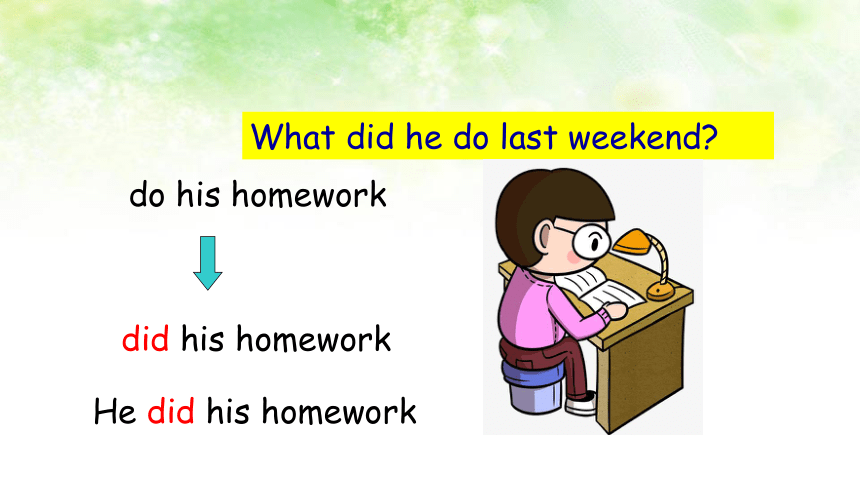

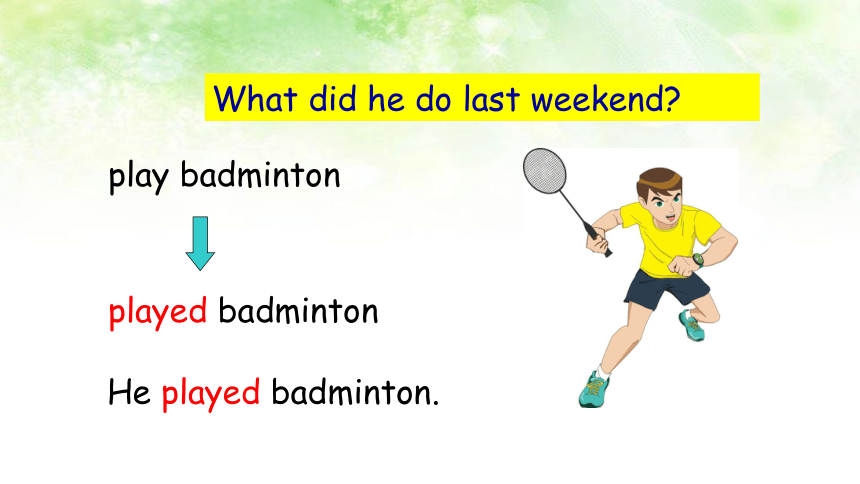
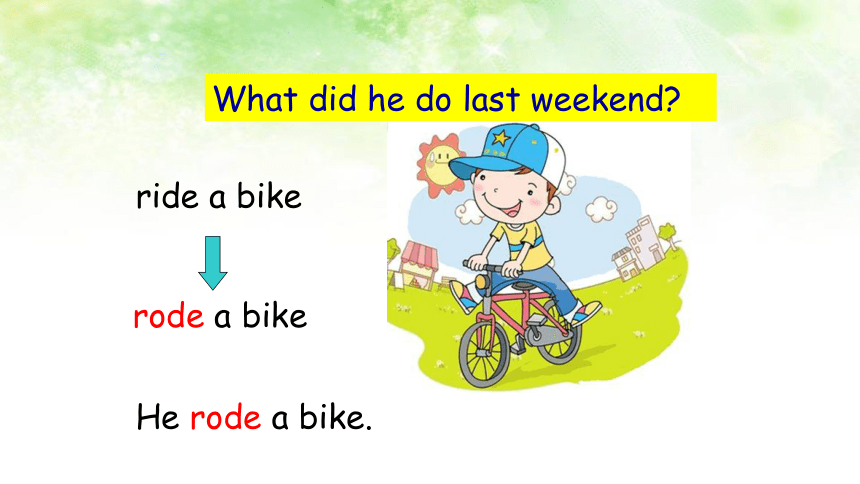


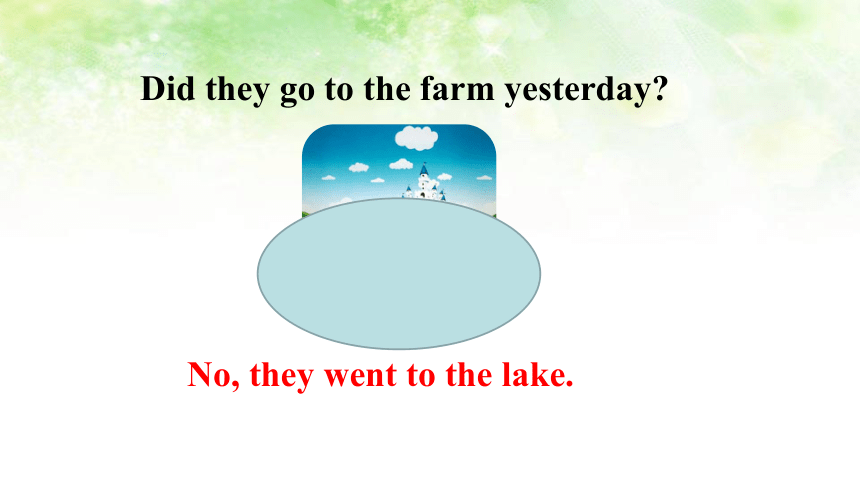

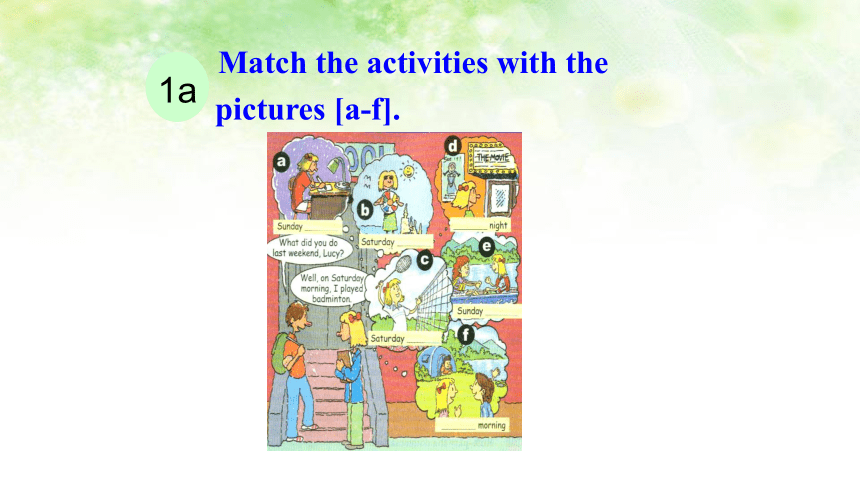

文档简介
(共55张PPT)
Unit
12
Unit
12
What
did
you
do
last
weekend?
Section
A
1a-1c
What
did
he
do
last
weekend?
did
his
homework
do
his
homework
He
did
his
homework
go
boating
went
boating
He
went
boating.
play
badminton
What
did
he
do
last
weekend?
played
badminton
He
played
badminton.
He
rode
a
bike.
ride
a
bike
rode
a
bike
What
did
he
do
last
weekend?
He
went
to
the
cinema.
go
to
the
cinema
went
to
the
cinema
What
did
he
do
last
weekend?
No,
they
didn't.They
camped.
Did
they
climb
the
mountain
last
weekend?
No,
they
went
to
the
lake.
Did
they
go
to
the
farm
yesterday?
Yes,
they
did.
Did
they
go
to
the
beach
yesterday?
1a
Match
the
activities
with
the
pictures
[a-f].
1.
did
my
homework
_____
2.
went
to
the
cinema
____
3.
went
boating
______
4.
camped
by
the
lake
_____
5.
went
to
the
beach
______
6.
played
badminton
______
a
d
e
f
b
c
1b
Listen
and
write
the
day,
morning,
afternoon
or
night
below
each
picture.
Sunday
night
Saturday
afternoon
Sunday
afternoon
Saturday
morning
Sunday
morning
Saturday
night
B:
What
did
you
do
last
weekend,
Lucy?
A:
Well,
on
Saturday
morning,
I
played
badminton.
1c
Role-play
What
did
you
do
last
weekend?
visited
aunt
/
grandma
What
did
you
do
last
weekend?
did
my
homework
/
sports
What
did
you
do
last
weekend?
studied
for
the
English
/
math
test
What
did
you
do
last
weekend?
went
to
a
farm
/
beach
What
did
you
do
last
weekend?
fed
some
sheep
/
cows
“go
+
V-ing形式”常用来表示从事某种活动。如:
1.
go
boating
去划船
go
shopping
去购物
go
camping
去野营
go
boating
去划船
go
fishing
去钓鱼
Language
points
2.
On
Saturday
morning,
I
played
badminton.
星期六上午我打羽毛球了。
在上午/下午/
晚上要用介词in,在
具体某一天的上午/
下午/
晚上,则
要用介词on。
e.g.
in
the
evening
在晚上
on
Sunday
evening
在周日晚上
Practise
_______
Sunday
afternoon,
Mike
fed
some
sheep
on
the
farm.
On
当play与表示球类或棋类运动的名词连用时,不用定冠词。表示演奏某种乐器时,要与定冠词the连用。
e.g.
play
football,
play
baseball…
play
the
piano,
play
the
violin…
Guessing
game!
What
did
he
do?
He
played
badminton.
He
went
boating.
What
did
he
do?
He
went
to
the
cinema.
What
did
he
do?
They
went
to
the
beach.
What
did
they
do?
They
went
fishing.
What
did
they
do?
He
did
his
homework.
What
did
he
do
last
weekend?
They
visited
a
history
museum.
What
did
they
do
last
weekend?
1.
I
visited
my
(aunt/grandma).
2.
I
did
my
(homework/sports).
3.
I
studied
for
the
(English/
math)
rest.
4.
I
went
to
the
(farm/beach).
5.
I
fed
some
(sheep/cows).
Listen
and
underline
the
words
you
hear.
2a
Listen
again.
Write
C
for
Carol,
J
for
Jack
or
B
for
Becky
next
to
the
statements
in
2a.
1.
____
I
visited
my
(aunt/grandma).
2.
____
I
did
my
(homework/sports).
3.
____
I
studied
for
the
(English
/math)
test.
4.
____
I
went
to
the
(farm/beach).
5.
____
I
fed
some
(sheep/cows).
B
B
C
J
J
2b
Make
conversations
according
to
the
information
you
heard
in
2a
and
2b.
Ms.
Clark:
Hi,
Becky.
What
did
you
do
lastweekend?
Becky:
I
visited
my
grandma.
Ms.
Clark:
That’s
nice!
Who
did
you
go
with?
Becky:
My
parents.
Ms.
Clark:
What
about
you,
Carol?
Where
did
you
go?
Carol:
I
went
to
the
...
2c
He
studied
for
his
English
test.
What
did
he
do?
Who
stayed
at
home
last
weekend?
Carol.
I
think.
How
was
Lisa’s
weekend?
______________________
2.
Where
did
Lisa
work
as
a
guide?
_____________________________
Read
the
conversation
and
answer
the
questions.
It
was
great.
Reading
At
the
Natural
History
Museum.
2d
3.
What
did
she
do
there?
_____________________________
_____________________________
4.
Why
is
Paul
tired
now?
_____________________________
_____________________________
She
told
the
visitors
about
the
butterflies
and
their
living
habits.
Because
he
stayed
up
late
to
watch
the
soccer
game.
Paul:
Hi,
Lisa.
How
was
your
weekend?
Lisa:
Great.
Thanks.
Paul:
What
did
you
do?
Lisa:
I
worked
as
a
guide
at
the
Natural
History
Museum.
Role-play
the
conversation.
Role-play
2d
Paul:
Really?
How
interesting!
Lisa:
Yeah,
it
was
fun.
They
have
a
butterfly
house
with
over
200
kinds
of
butterflies!
I
told
the
visitors
about
them
and
their
living
habits.
Did
you
have
a
good
weekend?
Paul:
Yeah,
it
was
good,
but
I’m
kind
of
tired
now.
I
stayed
up
late
to
watch
the
soccer
game.
Language
points
1.
How
interesting!
多么有趣啊!
这是个感叹句。
感叹句结构:“How
+
形容词或副词+
感叹号
(!)”,表示
“多么……!”
eg.
瞧那只鸟,多么漂亮呀!
Look
at
that
bird.
How
beautiful!
2.
They
have
a
butterfly
house
with
over
200
kinds
of
butterflies!
它们(指博物馆)有一个有200多种蝴蝶的蝴蝶馆!
butterfly
house
表示“蝴蝶馆”。
句中的with是介词,意为“有;带有”。
英语中house既可表示房子,也可表示家与所处的语境密切相关。
例如:a
big
house
表示“一座大房子”。
I
hope
you
all
can
come
to
my
house
this
Sunday
for
coffee.
我希望这个礼拜天你们全都能够来我家
喝咖啡。
句中的kind是名词,意为“种;类”,是可数名词。如:
There
are
three
kinds
of
fruits
on
the
table.
桌子上有三种水果。
【链接】与kind有关的短语有:
a
kind
of
“一种;某种(不明确的东西)”,
kind
of
“有点”,many
/
different
/
all
kinds
of
“各种各样的”。
【运用】将下列句子翻译成汉语。
(1)
It
is
a
kind
of
animal
with
long
ears
and
small
eyes.
__________________________________
它是一种长耳朵小眼睛的动物。
(2)
There
are
five
kinds
of
books
in
the
library.
________________________________
(3)
My
uncle
bought
a
house
with
a
big
garden.
________________________________
图书馆里有五种书。
我叔叔买了一幢带有大花园的房子。
…,
but
I'm
kind
of
tired
now.
但现在我有点累。
tired
作形容词,意思是疲倦的;疲劳的;累的;厌烦的。
她有点累了。
She
is
a
little
tired.
4.
I
stayed
up
late
to
watch
the
soccer
game.我熬夜看足球赛。
stay
up
late
深夜不睡;熬夜
Afterwards
she
relented
and
let
the
children
stay
up
late
to
watch
TV.
后来她宽容了些,让孩子们晚睡看电视。
5.sheep
名词,意为“绵羊”。它是单复数同形
的单词,当它作主语时谓语动词的单复数形式
要根据它在句中的意思来确定。类似的单词还
有deer
(鹿),Chinese
(中国人)等。
e.g.
Where
are
your
sheep,
Ted?
Every
sheep
has
a
thick
woolly
coat.
每只羊身上都穿着一件厚的羊毛外套。
6.I
worked
as
a
guide
at
the
Natural
History
Museum.
我在自然历史博物馆里做导游的工作。
“work
as
+
职业”
意为“做某工作”。
e.g.
Eric
works
as
a
music
teacher
in
the
club.
埃里克在那家俱乐部里做音乐老师的工作。
Exercise
选择适当的单词完成句子。
sheep,
stay,
butterfly,
tired,
lake
1.
Lisa,
can
you
______
at
home
and
look
after
(照看)
your
little
sister?
2.
In
the
farm,
I
fed
some
_____
yesterday.
3.
I
was
very
____
after
the
school
trip.
4.
I
saw
many
_________
flying
in
the
countryside.
5.
Last
weekend,
we
camped
by
the
____.
lake
stay
sheep
tired
butterflies
用所给单词的适当形式完成句子。
1.
Last
weekend
Tom’s
sister
______
(go)
to
the
beach.
2.
_____
(do)
Lana
study
for
her
math
test
last
night?
3.
I
____
(tell)
the
visitors
about
the
butterflies
and
their
habits
last
weekend.
4.
Last
Monday
afternoon
Ben
_______
(play)
soccer
with
his
brother.
5.
At
that
time
I
______
(work)
as
a
guide
at
the
Natural
History
Museum.
worked
went
Did
told
played
Translate
and
write
them
down.
1.
上周末你做什么了?
2.
星期六的早上,我踢足球了。
3.
星期天的晚上,我看电视了。
On
Saturday
morning,
I
played
soccer.
On
Sunday
night,
I
watched
TV.
What
did
you
do
last
weekend?
4.
露西上周末没有打网球。
Lucy
didn’t
play
tennis
last
weekend.
5.
我在看电视,上周五我也看电视了。
I
am
watching
TV
now.
Last
Friday
I
watched
TV,
too.
空白演示
单击输入您的封面副标题
Unit
12
Unit
12
What
did
you
do
last
weekend?
Section
A
1a-1c
What
did
he
do
last
weekend?
did
his
homework
do
his
homework
He
did
his
homework
go
boating
went
boating
He
went
boating.
play
badminton
What
did
he
do
last
weekend?
played
badminton
He
played
badminton.
He
rode
a
bike.
ride
a
bike
rode
a
bike
What
did
he
do
last
weekend?
He
went
to
the
cinema.
go
to
the
cinema
went
to
the
cinema
What
did
he
do
last
weekend?
No,
they
didn't.They
camped.
Did
they
climb
the
mountain
last
weekend?
No,
they
went
to
the
lake.
Did
they
go
to
the
farm
yesterday?
Yes,
they
did.
Did
they
go
to
the
beach
yesterday?
1a
Match
the
activities
with
the
pictures
[a-f].
1.
did
my
homework
_____
2.
went
to
the
cinema
____
3.
went
boating
______
4.
camped
by
the
lake
_____
5.
went
to
the
beach
______
6.
played
badminton
______
a
d
e
f
b
c
1b
Listen
and
write
the
day,
morning,
afternoon
or
night
below
each
picture.
Sunday
night
Saturday
afternoon
Sunday
afternoon
Saturday
morning
Sunday
morning
Saturday
night
B:
What
did
you
do
last
weekend,
Lucy?
A:
Well,
on
Saturday
morning,
I
played
badminton.
1c
Role-play
What
did
you
do
last
weekend?
visited
aunt
/
grandma
What
did
you
do
last
weekend?
did
my
homework
/
sports
What
did
you
do
last
weekend?
studied
for
the
English
/
math
test
What
did
you
do
last
weekend?
went
to
a
farm
/
beach
What
did
you
do
last
weekend?
fed
some
sheep
/
cows
“go
+
V-ing形式”常用来表示从事某种活动。如:
1.
go
boating
去划船
go
shopping
去购物
go
camping
去野营
go
boating
去划船
go
fishing
去钓鱼
Language
points
2.
On
Saturday
morning,
I
played
badminton.
星期六上午我打羽毛球了。
在上午/下午/
晚上要用介词in,在
具体某一天的上午/
下午/
晚上,则
要用介词on。
e.g.
in
the
evening
在晚上
on
Sunday
evening
在周日晚上
Practise
_______
Sunday
afternoon,
Mike
fed
some
sheep
on
the
farm.
On
当play与表示球类或棋类运动的名词连用时,不用定冠词。表示演奏某种乐器时,要与定冠词the连用。
e.g.
play
football,
play
baseball…
play
the
piano,
play
the
violin…
Guessing
game!
What
did
he
do?
He
played
badminton.
He
went
boating.
What
did
he
do?
He
went
to
the
cinema.
What
did
he
do?
They
went
to
the
beach.
What
did
they
do?
They
went
fishing.
What
did
they
do?
He
did
his
homework.
What
did
he
do
last
weekend?
They
visited
a
history
museum.
What
did
they
do
last
weekend?
1.
I
visited
my
(aunt/grandma).
2.
I
did
my
(homework/sports).
3.
I
studied
for
the
(English/
math)
rest.
4.
I
went
to
the
(farm/beach).
5.
I
fed
some
(sheep/cows).
Listen
and
underline
the
words
you
hear.
2a
Listen
again.
Write
C
for
Carol,
J
for
Jack
or
B
for
Becky
next
to
the
statements
in
2a.
1.
____
I
visited
my
(aunt/grandma).
2.
____
I
did
my
(homework/sports).
3.
____
I
studied
for
the
(English
/math)
test.
4.
____
I
went
to
the
(farm/beach).
5.
____
I
fed
some
(sheep/cows).
B
B
C
J
J
2b
Make
conversations
according
to
the
information
you
heard
in
2a
and
2b.
Ms.
Clark:
Hi,
Becky.
What
did
you
do
lastweekend?
Becky:
I
visited
my
grandma.
Ms.
Clark:
That’s
nice!
Who
did
you
go
with?
Becky:
My
parents.
Ms.
Clark:
What
about
you,
Carol?
Where
did
you
go?
Carol:
I
went
to
the
...
2c
He
studied
for
his
English
test.
What
did
he
do?
Who
stayed
at
home
last
weekend?
Carol.
I
think.
How
was
Lisa’s
weekend?
______________________
2.
Where
did
Lisa
work
as
a
guide?
_____________________________
Read
the
conversation
and
answer
the
questions.
It
was
great.
Reading
At
the
Natural
History
Museum.
2d
3.
What
did
she
do
there?
_____________________________
_____________________________
4.
Why
is
Paul
tired
now?
_____________________________
_____________________________
She
told
the
visitors
about
the
butterflies
and
their
living
habits.
Because
he
stayed
up
late
to
watch
the
soccer
game.
Paul:
Hi,
Lisa.
How
was
your
weekend?
Lisa:
Great.
Thanks.
Paul:
What
did
you
do?
Lisa:
I
worked
as
a
guide
at
the
Natural
History
Museum.
Role-play
the
conversation.
Role-play
2d
Paul:
Really?
How
interesting!
Lisa:
Yeah,
it
was
fun.
They
have
a
butterfly
house
with
over
200
kinds
of
butterflies!
I
told
the
visitors
about
them
and
their
living
habits.
Did
you
have
a
good
weekend?
Paul:
Yeah,
it
was
good,
but
I’m
kind
of
tired
now.
I
stayed
up
late
to
watch
the
soccer
game.
Language
points
1.
How
interesting!
多么有趣啊!
这是个感叹句。
感叹句结构:“How
+
形容词或副词+
感叹号
(!)”,表示
“多么……!”
eg.
瞧那只鸟,多么漂亮呀!
Look
at
that
bird.
How
beautiful!
2.
They
have
a
butterfly
house
with
over
200
kinds
of
butterflies!
它们(指博物馆)有一个有200多种蝴蝶的蝴蝶馆!
butterfly
house
表示“蝴蝶馆”。
句中的with是介词,意为“有;带有”。
英语中house既可表示房子,也可表示家与所处的语境密切相关。
例如:a
big
house
表示“一座大房子”。
I
hope
you
all
can
come
to
my
house
this
Sunday
for
coffee.
我希望这个礼拜天你们全都能够来我家
喝咖啡。
句中的kind是名词,意为“种;类”,是可数名词。如:
There
are
three
kinds
of
fruits
on
the
table.
桌子上有三种水果。
【链接】与kind有关的短语有:
a
kind
of
“一种;某种(不明确的东西)”,
kind
of
“有点”,many
/
different
/
all
kinds
of
“各种各样的”。
【运用】将下列句子翻译成汉语。
(1)
It
is
a
kind
of
animal
with
long
ears
and
small
eyes.
__________________________________
它是一种长耳朵小眼睛的动物。
(2)
There
are
five
kinds
of
books
in
the
library.
________________________________
(3)
My
uncle
bought
a
house
with
a
big
garden.
________________________________
图书馆里有五种书。
我叔叔买了一幢带有大花园的房子。
…,
but
I'm
kind
of
tired
now.
但现在我有点累。
tired
作形容词,意思是疲倦的;疲劳的;累的;厌烦的。
她有点累了。
She
is
a
little
tired.
4.
I
stayed
up
late
to
watch
the
soccer
game.我熬夜看足球赛。
stay
up
late
深夜不睡;熬夜
Afterwards
she
relented
and
let
the
children
stay
up
late
to
watch
TV.
后来她宽容了些,让孩子们晚睡看电视。
5.sheep
名词,意为“绵羊”。它是单复数同形
的单词,当它作主语时谓语动词的单复数形式
要根据它在句中的意思来确定。类似的单词还
有deer
(鹿),Chinese
(中国人)等。
e.g.
Where
are
your
sheep,
Ted?
Every
sheep
has
a
thick
woolly
coat.
每只羊身上都穿着一件厚的羊毛外套。
6.I
worked
as
a
guide
at
the
Natural
History
Museum.
我在自然历史博物馆里做导游的工作。
“work
as
+
职业”
意为“做某工作”。
e.g.
Eric
works
as
a
music
teacher
in
the
club.
埃里克在那家俱乐部里做音乐老师的工作。
Exercise
选择适当的单词完成句子。
sheep,
stay,
butterfly,
tired,
lake
1.
Lisa,
can
you
______
at
home
and
look
after
(照看)
your
little
sister?
2.
In
the
farm,
I
fed
some
_____
yesterday.
3.
I
was
very
____
after
the
school
trip.
4.
I
saw
many
_________
flying
in
the
countryside.
5.
Last
weekend,
we
camped
by
the
____.
lake
stay
sheep
tired
butterflies
用所给单词的适当形式完成句子。
1.
Last
weekend
Tom’s
sister
______
(go)
to
the
beach.
2.
_____
(do)
Lana
study
for
her
math
test
last
night?
3.
I
____
(tell)
the
visitors
about
the
butterflies
and
their
habits
last
weekend.
4.
Last
Monday
afternoon
Ben
_______
(play)
soccer
with
his
brother.
5.
At
that
time
I
______
(work)
as
a
guide
at
the
Natural
History
Museum.
worked
went
Did
told
played
Translate
and
write
them
down.
1.
上周末你做什么了?
2.
星期六的早上,我踢足球了。
3.
星期天的晚上,我看电视了。
On
Saturday
morning,
I
played
soccer.
On
Sunday
night,
I
watched
TV.
What
did
you
do
last
weekend?
4.
露西上周末没有打网球。
Lucy
didn’t
play
tennis
last
weekend.
5.
我在看电视,上周五我也看电视了。
I
am
watching
TV
now.
Last
Friday
I
watched
TV,
too.
空白演示
单击输入您的封面副标题
同课章节目录
- Unit 1 Can you play the guitar?
- Section A
- Section B
- Unit 2 What time do you go to school?
- Section A
- Section B
- Unit 3 How do you get to school?
- Section A
- Section B
- Unit 4 Don't eat in class.
- Section A
- Section B
- Unit 5 Why do you like pandas?
- Section A
- Section B
- Unit 6 I'm watching TV.
- Section A
- Section B
- Review of Units 1-6
- Unit 7 It's raining!
- Section A
- Section B
- Unit 8 Is there a post office near here?
- Section A
- Section B
- Unit 9 What does he look like?
- Section A
- Section B
- Unit 10 I'd like some noodles.
- Section A
- Section B
- Unit 11 How was your school trip?
- Section A
- Section B
- Unit 12 What did you do last weekend?
- Section A
- Section B
